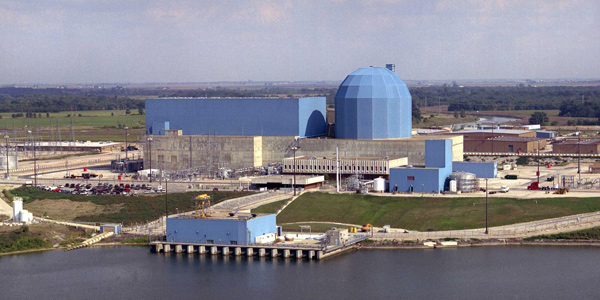By Rich Heidorn Jr.
Illinois’ nuclear generation subsidies do not interfere with FERC-regulated wholesale power markets, the 7th U.S. Circuit Court of Appeals ruled Thursday in the latest judicial pronouncement on state-federal jurisdiction over the electric industry.
The 7th Circuit ruling in Electric Power Supply Association v. Anthony M. Starr upheld a July 2017 district court ruling and was consistent with an amicus brief by FERC that said the Illinois zero-emission credits program did not violate the Federal Power Act. Starr is director of the Illinois Power Agency. (See Analyst: FERC Asserts Role in Handling Nuke Subsidies.)

Exelon’s Clinton nuclear facility, which benefits from Illinois’ zero-emissions credit program. | Nuclear Regulatory Commission
The court’s opinion cited the Supreme Court’s 2016 Hughes v. Talen ruling, in which the court rejected Maryland regulators’ attempt to subsidize a combined cycle plant, saying that the state’s contract for differences — which required the generator to bid into and clear the PJM capacity market — could distort prices. The court cautioned that its opinion should not “be read to foreclose [states] from encouraging production of new or clean generation through measures ‘untethered to a generator’s wholesale market participation.’”
“And that’s what Illinois has done,” the 7th Circuit said Thursday. “To receive a credit, a firm must generate power, but how it sells that power is up to it. It can sell the power in an interstate auction but need not do so. It may choose instead to sell power through bilateral contracts with users (such as industrial plants) or local distribution companies that transmit the power to residences.”
EPSA had contended that the ZEC program infringed on FERC’s jurisdiction by indirectly regulating interstate energy markets by using average auction prices as a component in a formula that affects the cost of the ZECs. But the court said the value of ZECs does not depend on the generators’ auction offers.
“Every successful bidder in an interstate auction receives the price of the highest bid that clears the market. The owner of a credit receives that market‐clearing price, with none of the adjustments that Maryland law required,” the court wrote. “The zero‐emissions credit system can influence the auction price only indirectly, by keeping active a generation facility that otherwise might close and by raising the costs that carbon‐releasing producers incur to do business. A larger supply of electricity means a lower market‐clearing price, holding demand constant. But because states retain authority over power generation, a state policy that affects price only by increasing the quantity of power available for sale is not preempted by federal law.”
The court also rejected claims that Illinois’ program violated the dormant Commerce Clause, saying “the cross subsidy among producers may injure investors in carbon-releasing plants, but only those plants in Illinois (for the state’s regulatory power stops at the border).”
The court noted FERC’s June ruling requiring PJM to change its minimum offer price rule to address capacity market price suppression from state subsidies for renewables and nuclear power. (See FERC Orders PJM Capacity Market Revamp.)
EPSA had contended that FERC’s ruling was proof that the Illinois statute must be pre-empted. “But that’s not what the commission said,” the court noted. “Instead of deeming state systems such as Illinois’ to be forbidden, the commission has taken them as givens and set out to make the best of the situation they produce.”
EPSA said it was reviewing the order and hadn’t decided whether to seek a Supreme Court review. A similar court challenge is pending in the 2nd Circuit over New York’s ZEC program. (See 2nd Circuit Hears New York ZEC Appeal.)
“Today’s decision confirms that state subsidy programs such as nuclear bailout ZECs can harm wholesale markets,” EPSA said in a statement. “FERC told the 7th Circuit the commission can mitigate these negative effects and today’s opinion relies on that representation. EPSA now expects FERC to act promptly in the pending PJM capacity market docket to prevent the acknowledged harms state ZEC programs inflict on federally-regulated wholesale power markets.”
Analysts at ClearView Energy Partners issued a research note Thursday predicting the 2nd Circuit will also uphold the New York ZECs. “If the ZEC’s opponents seek review at the U.S. Supreme Court (via a petition for a writ of certiorari), we think they face an uphill battle,” ClearView said.
The analysts acknowledged however, that the 2nd Circuit’s rejection of the New York ZEC program “could meaningfully improve the prospects for Supreme Court review” to resolve the split rulings.




